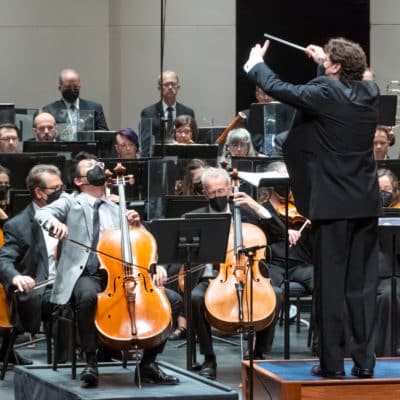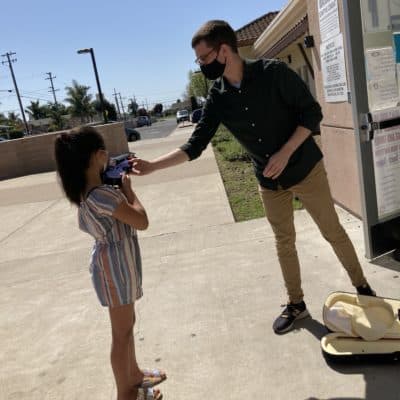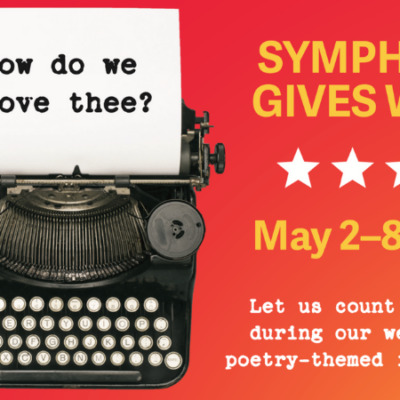For the teachers, Sound Minds is not just about learning an instrument and raising academic standards; it’s teaching persistence, personal responsibility and life skills—and opening students up to a wider world of opportunities they would never otherwise have dreamed of.

Amy Haltom is Program Coordinator for Sound Minds and been with the program since its inception in 2012. David Sego joined Sound Minds in 2016. Both teach violin in the Sound Minds program.
CSO: What would you like people to understand about Sound Minds?
AH: That it is a music education program that’s not just about music. It’s about building community, teaching life skills, teaching responsibility through the act of making music together. It’s designed to bring a community closer together and instill a sense of responsibility in the children that participate in the program.
DS: Sound Minds sets our students up for academic success beyond their musical participation. We track our students’ performance academically year over year and we see massive improvement compared to their peers who are progressing much less quickly. So we find that that is a huge benefit. And all of that comes from the skills they are learning from musicianship.
CSO: How do the students do in terms of musical progress?
DS: Our students get a big head start on their musical skills. By starting in the second grade we are two to three years ahead of most Elementary school programs in the Bay Area and that leads to a lot of success for them. By sixth grade, they’re displaying skills that high school students are learning in other orchestra programs. So that’s really exciting to see.
This last year, our students did a side-by-side rehearsal with the Dougherty Valley High School orchestra and our 6th graders were keeping up with those high school kids, like, no sweat! One of the high school kids said “Wow, you know, I didn’t even learn this until tenth grade!” So it was really exciting to see that our kids are way ahead of the game by starting so early.

CSO: Why does Sound Minds matter?
AH: One reason I think Sound Minds is really is important to this community is that this community is under a lot of economic stress. In being with the program 7 years, I’ve seen that worsen over time. I see houses where more and more cars are parking because they have to let out a room in their house to a tenant because they need to make ends meet, so they can get food for their family.
Populations like this don’t have any resources left over to do things like get an instrument for their child or get lessons for their child, so I feel like what we can give them is something that they wouldn’t get otherwise.

AH: We had a student here who was part of the pilot program—Diego. He played the cello and he was a very charming little guy and he told the principal one time that he wanted to become a musician. The principal reminded him that he already was a musician, and so he said, “Well, I want to take it to the next level.”
To me, knowing Diego and where he came from—he was a little bit unruly when he was a younger student, and sometimes he struggled and wanted to quit—but then he took it upon himself to continue to the very end and he is now having success in middle school as a result. I’m very proud of students like Diego who realize that if they stick with something that might be difficult, that they might not get in the first year or two, that they have a whole world of rewards that can come back to them as a result.
DS: With Sound Minds, it’s special to see the cohesiveness of the community that forms among the students. Even within the first year, they start to think together and work together and that cohesion builds into really deep friendships… so that by the time they graduate they feel like they really belong somewhere.
They’ve also by then connected to the wider community, so they’ve got friends now at a high school many miles away, and they have an opportunity to transition to a program at the East Bay Center for the Performing Arts where they then connect to an even wider artistic community in the Bay Area. I feel like that community they develop is the most important thing.

CSO: What is your hope for the future for these kids?
AH: My hope is that this program has shown them that there is a wider world out there for them, and that despite any temporary circumstances that they might be going through, that this is an opportunity for them to connect to a broader world and to go places—either in their imagination or literally—that they never would have imagined otherwise. So I feel that is something really important that we can give them for the future.
DS: I feel that Sound Minds gives our students a lot of confidence in their ability to learn and be lifelong learners. I know that in my own life that music took me places I never would have dreamed of going — overseas, to Europe and Russia, meeting people from all over the world. It really broadened my own outlook. I try to share with my students on a daily basis that that world is out there and that if they work hard and express themselves in such a beautiful way, that someday they might be able to do something like that too.
You can support the Sound Minds program and other music education and community engagement initiatives, making a difference in the lives of thousands of people in the Bay Area, when you give during the Fall Matching Challenge—our largest fundraiser of the 2019/20 season. Your gift is matched and your impact doubled through October 31, 2019. Donate online or call the office at 925.280.2490 for assistance.




